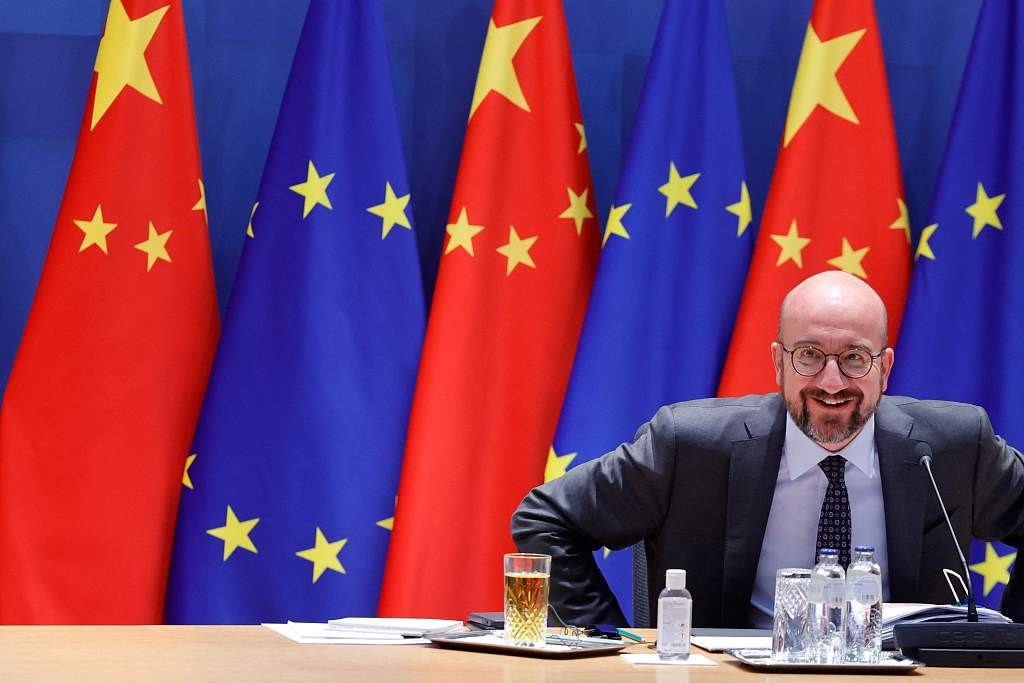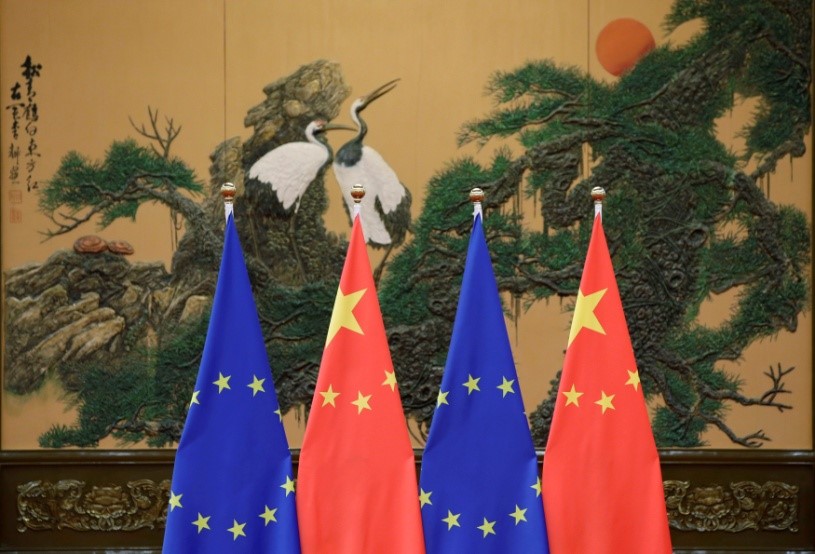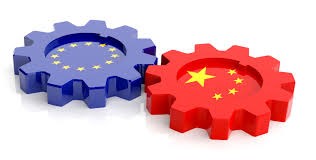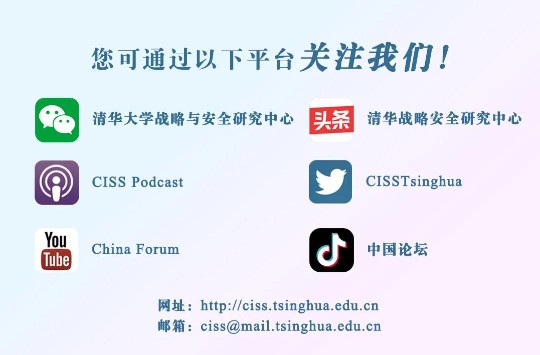一、米歇尔主席访华,体现了欧盟发展对华关系的良好意愿。中欧是维护世界和平的两大力量、促进共同发展的两大市场、推动人类进步的两大文明。中欧关系保持向前向上势头,坚持互利共赢,符合中欧和国际社会的共同利益。国际形势越动荡、全球挑战越突出,中欧关系的世界意义就越凸显。
President Xi noted that President Michel's visit to China on behalf of the Member States of the European Union (EU) shortly after the 20th National Congress of the Communist Party of China (CPC) represents the EU's goodwill of furthering relations with China. China and the EU are two major forces upholding world peace, two big markets promoting shared development, and two great civilizations promoting human progress. Maintaining an onward and upward momentum in the China-EU relationship and keeping it mutually beneficial serves the interests of both sides and those of the international community. The more unstable the international situation becomes and the more acute challenges the world faces, the greater global significance China-EU relations take on.
(December 1, 2022. “President Xi Jinping Holds Talks with European Council President Charles Michel” Ministry of Foreign Affairs, the People's Republic of China)
二、欧盟表示将对欧中经贸关系“再平衡”,减少对中国的过分依赖,但愿与中国保持接触并深化互利合作。中方表示将持续对欧洲企业开放市场,反对“脱钩”及贸易和技术政治化和武器化。
The European Union is seeking to engage with China more, despite the two sides having differing views on multiple issues, to prevent a repeat of the mistakes the bloc made with its over-reliance on Russian energy, a top official said.
Charles Michel, president of the European Council, told reporters at the G20 summit in Bali on Tuesday that the EU would be firm in defending its interests and promoting its values, but understood that “it's important to listen to each other, to try to develop a better mutual understanding”. “With China, we don't want to be too dependent [on it] for the innovative technology that we need today and that we need more in the future. That's why it is important to rebalance the relationship,” he said.
(November 15, 2022. “EU-China relations: bloc seeks 'rebalance' of ties to reduce dependence, increase engagement” South China Morning Post)
On trade, Michel stressed that a key issue for EU leaders is the rebalancing of the relationship and "set out the difficulties faced by EU companies and investors, which have been exacerbated by the pandemic." Xi, meanwhile, told Michel that he hoped "EU institutions and member states will establish an objective and correct perception of China". "China will remain open to European companies, and hopes the EU can eliminate interference to provide a fair and transparent business environment for Chinese companies," the Chinese leader also told Michel.
(December 1, 2022. “China's Xi and EU's Michel call for Ukraine de-escalation at meeting”Euronews)
"[China and the EU] should jointly oppose decoupling, and jointly oppose politicization and weaponization of trade and technology. China will remain open to European companies and hopes that the EU would reject interference and provide Chinese companies with a fair and transparent business environment," Xi added.
(December 1, 2022. “Seizing on EU tensions with US, Xi tells Europe to keep investing in China” Politico)
三、欧盟对华关系较前更加复杂和喜忧参半,迫切需要重新定义其对华政策,欧盟将中国视为“合作和谈判伙伴、经济竞争者和制度性对手”的“三重定位”在实际中如何兼容是个问题。
After German Chancellor Olaf Scholz's China visit last month, there were intense discussions on the EU's China strategy inside the European Council among the 27 leaders of the member states. It is more than obvious that the EU is redefining its relationship with China in a way that this could serve best to optimize its sovereignty in a multilateral world.
From the perspective of the EU, the bilateral relationship with China has become more complex and ambivalent than ever. China has been seen simultaneously as a "cooperation and negotiating partner," an "economic competitor" and "a systemic rival promoting alternative models of governance," as stated in the EU-China Strategic Outlook published in March 2019. This three-dimensional definition describes in a particularly accurate way that the diplomatic complexity with Beijing is characterized at the same time by cooperation, competition, and conflict. It remains unclear how the three dimensions could be compatible, could be somehow interrelated and how they should be understood in the long run.
(December 1, 2022. “Charles Michel's visit to Beijing: looking for a common impetus on the EU-China relationship” CGTN)

四、欧洲持续受到来自美国的压力,要求欧洲能够效仿美国对中国采取出口管制限制,遭到一些欧盟国家的质疑。欧盟外交与安全政策高级代表博雷利在欧洲议会会议上表示,欧盟不打算像美国一样,向中国采取严厉政策。
Josep Borrell, the EU's high representative for foreign affairs and security policy, speaking at the European Parliament on November 22, put the EU's emphasis on cooperation with China. Noting differences with China – including on democracy, human rights, and multilateralism – Borrell also said: “China is becoming increasingly assertive and developing an increasingly vigorous competition.” But, crucially, he closed his speech by saying: “The United States are our most important ally but, in some cases, we will not be in the same position or on the same approach to towards China.”
While the US has started to increase pressure on EU allies to align more closely with its hard line on China, Europeans have been pushing back. There have been reports about Dutch concerns over new US export restrictions to China. The French president, Emmanuel Macron, who is to meet Biden in Washington on December 1, is expected to raise EU-China relations in their discussions. And perhaps most importantly, during German chancellor Olaf Scholz's recent visit to China, the emphasis was very much more on economic cooperation than on political competition.
(November 30, 2022. “Western leaders are divided over the future of relations with China” The Conversation)

(图片来源:Reuters)
五、尽管欧盟表示中国是制度性对手,欧盟在寻求制定有别于美国的对华战略。欧洲统计局的数据显示,2021年中国是欧洲商品的第三大买家,是欧盟进口产品的最重要市场。在欧洲经济因俄乌战争而陷入困境之时,中国市场对欧洲变得更加重要。
While the European Union has dubbed China as a “strategic rival” on different occasions, it is pursuing a different approach from the U.S. “The EU is trying to carve out its own China strategy that is distinct from the U.S. This strategy is about ‘de-risking’ the relationship, rather than ‘de-coupling’,” Anna Rosenberg, head of geopolitics at Amundi Asset Management. De-coupling refers to the separation of economic ties between the two superpowers. But, for the EU this is not in its interest.
Data from Europe’s statistics office showed that China was the third largest buyer of European goods and the most important market for imported EU products in 2021. The importance of China as a market for Europe becomes even more relevant at a time when its economy is struggling from Russia’s invasion of Ukraine. “While the U.S. is trying to pull the EU into its direction to distance itself from China, the EU is keen to maintain economic ties to China. This desire is accentuated by the economic fallout from the war which will affect European economies more acutely next year,” Rosenberg said.
(December 2, 2022. “The U.S. wants the EU to be strict with China. But Europe can’t afford it” CNBC)

(图片来源:Friends of Europe)
六、欧洲国家政界就对华政策存在争议,一些政客还要求限制特定中国产品的进口并敦促企业寻找其他市场,但一些大企业表示退出中国市场“难以想象”。
Take the example of the UK. In a speech at the Lord Mayor's Banquet in London – a traditional venue for UK leaders to lay out their foreign policy priorities – the UK's current prime minister, Rishi Sunak, advocated an approach of “robust pragmatism” towards China. This seeks to strike a balance between hardliners in his own party who seek a tougher approach to China and the interests of many businesses trading with China. But a recent decision by the UK government to ban the use of Chinese cameras in surveillance systems indicates that, for now, British hawks are winning in this debate.
Similar debates are happening in Germany. The government is debating new rules on private sector links with China that aim to incentivise German companies to seek markets elsewhere and decrease their dependency on China. In response, the chief executive of German car manufacturer Mercedes-Benz, Ola Källenius, said it was “absolutely inconceivable” to back out of the Chinese market.
This stance is likely to be shared by Volkswagen and BMW, as well as chemicals giant BASF, who together with Mercedes accounted for more than one-third of all European foreign direct investment in China between 2018 and 2021. The German coalition government is also far from united on China. The Green party, which holds both the economics and foreign affairs briefs in Chancellor Scholz's cabinet, in particular is far more reluctant to give China the benefit of the doubt.
(November 30, 2022. “Western leaders are divided over the future of relations with China”The Conversation)
编辑:蒋绍澄、程泽笠 审核:许馨匀、张立荣

